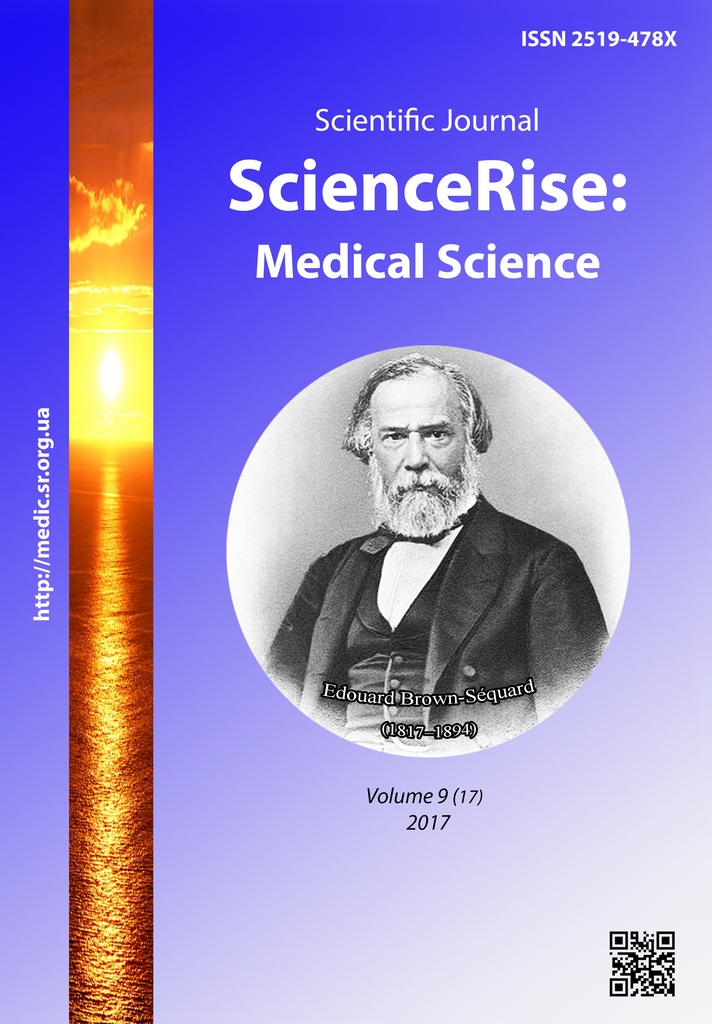Individual-psychological predictors of formation of dysadaptation states in doctors-interns
DOI:
https://doi.org/10.15587/2519-4798.2017.111036Keywords:
dysadaptation states, professional activity, doctors-interns, biological and social factors, mechanisms of formationAbstract
Aim of research. The study of individual-psychological predictors of dysadaptation states formation of doctors-interns for elaborating the system of their diagnostics, correction and psychoprophylaxis.
Materials and methods of research. For attaining the set aim, the complex examination of 213 doctors-interns of both genders of 22–25 years old (mean age 23±2 years) from the Kharkiv national medical university was realized in 2012–2016 with observing principles of bioethics and medical deontology.
Methods of research: clinical-anamnestic, psychodiagnostic, statistical.
Results: It was established, that 65,7 % of examined doctors-interns (55,7 % of men and 68,6 % of women) demonstrated dysadaptation states. The main role in dysadaptation states formation in doctors-interns is played by the following groups of factors: biological – chronic somatic pathology, organic pathology, bad habits, and psychosocial – discontent with labor conditions, deficit of positive emotions, imperfectness of mechanism of psychological defense, conflicts in the medical environment.
It was established, that manifestations of dysadaptive states in doctors-interns are the feeling of internal strain with the impossibility to relax, anxious and depressive manifestations, decrease of the intellectual activity productivity.
Three levels of dysadaptation of a family doctor to the professional activity were separated.
Conclusions: The formation of disorders of doctors-interns’ adaptation to the professional activity is conditioned by many factors, biological, social and psychological ones, presented in the indissoluble complex in it. This fact determines the specificity of pathogenesis and syndrome genesis of dysadaptive states.
The high, middle and low level of family doctors’ dysadaptation to the professional activity were described
References
- Pshuk, N. H., Kaminska, A. O. (2014). Deiaki indyvidualno-psykholohichni predyktory formuvannia profesiinoi dezadaptatsyi likariv khirurhichnoho ta terapevtychnoho profiliu. Ukrainskyi visnyk psykhonevrolohyi, 22 (1 (78)), 84–87.
- Vitenko, I. S. (2011). Spetsyfika adaptatsiynykh reaktsyi likaria zahalno praktyky – simeinoi medytsyny do profesiynoi diyalnosti. Medychna psykholohiya, 6 (3 (23)), 10–13.
- Vitenko, I. S. (2000). Psykholohichni osnovy profesiynoi pidhotovky simeinoho likaria. Kharkiv: Osnova, 224.
- Dorozhkin, Yu. N., Mazitova, L. T. (2007). Problemy social'noy adaptacii inostrannyh studentov. Sociologicheskie issledovaniya, 3, 73–77.
- Kokun, O. M. (2005). Adaptatsiya ta adaptatsiyni mozhlyvosti liudyny: prykladni aspekty. Aktualni problemy psykholohyi. Psykhofiziolohiya. Medychna psykholohiya. Henetychna psykholohiya, 5 (4), 77–85.
- Arshava, I. F. (2006). Funktsionalni stany liudyny v protsesi adaptatsyi do ekstremalnykh umov diyalnosti (u paradyhmi „osobystist-stan”). Visnyk APN Ukrainy. Pedahohika i psykholohiya, 4 (53), 82–90.
- Kozhyna, A. M., Markova, M. V., Hrynevych, E. H. (2013). Problemy adaptatsyi studentiv do navchalnoi diyalnosti u VUZi v umovakh kredyno-modulnoi systemy osvity. Naukovo-informatsiinyi visnyk Akademyi nauk vyshchoi osvity Ukrainy, 3 (86), 87–93.
- Sokolova, I. M. (2007). Psihofiziologicheskie mekhanizmy adaptacii studentov. Kharkiv: HGMU, 412.
- Voloshyn, P. V., Maruta, N. O., Kozhyna, H. M., Markova, M. V. et. al. (2016). Sotsialno-stresovi rozlady (klinika, diahnostyka, profilaktyka). Kharkiv, 335.
- Volosovets, O. P. (2006). Stratehiya yevrointehratsiynoho reformuvannia vyshchoi medychnoi osvity Ukrainy. Problemy medychnoi nauky ta osvity, 1, 5–12.
Downloads
Published
How to Cite
Issue
Section
License
Copyright (c) 2017 Valery Vjun

This work is licensed under a Creative Commons Attribution 4.0 International License.
Our journal abides by the Creative Commons CC BY copyright rights and permissions for open access journals.
Authors, who are published in this journal, agree to the following conditions:
1. The authors reserve the right to authorship of the work and pass the first publication right of this work to the journal under the terms of a Creative Commons CC BY, which allows others to freely distribute the published research with the obligatory reference to the authors of the original work and the first publication of the work in this journal.
2. The authors have the right to conclude separate supplement agreements that relate to non-exclusive work distribution in the form in which it has been published by the journal (for example, to upload the work to the online storage of the journal or publish it as part of a monograph), provided that the reference to the first publication of the work in this journal is included.









